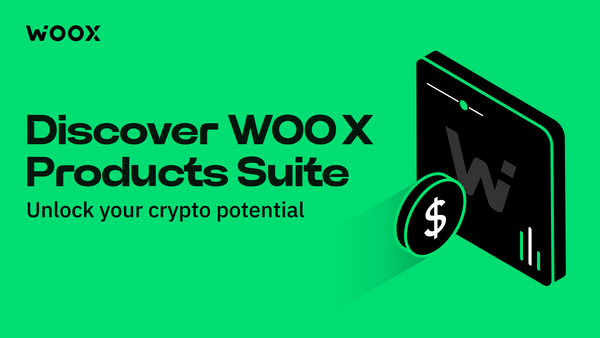Governance and Utility Tokens – What is the difference, and which one should I buy?
Article by CryptoJelleNL
When launching a new cryptocurrency token, devs need to answer an important question: what value does this token bring to potential investors? While some devs never manage to find a good answer to this question, the majority of altcoins are built on one of two principles; governance, or utility.
Some crypto-tokens are built on the premise that owning a token works similar to being a shareholder: giving you the right to vote on important decisions, and weighing the votes in accordance with your stake in the project. The more tokens you own, the bigger your influence.
Other tokens have a more practical approach, where owning the token allows the holder to perform a specific function on the network.
In today's article, WOO dives into these two subcategories in cryptocurrency, their differences, and which one may be best for you.
What is a governance token?
In its essence, owning a governance token allows you to vote on important proposals and decisions to be made for the project, or to make proposals for improvement yourself. Similarly to being a company shareholder, owning a governance token gives you a say in how the project is run.
As a result, governance token-holders generally have more conviction, as they are much more invested in the project's success. They are actively contributing to the decision-making process and can influence the direction and future of a project directly – generally resulting in a strong sense of community.
The governance token is a relatively new invention, which came to life when MakerDao (MKR) was launched as the governance token for stablecoin Dai. Holders of the Maker token can vote on proposals regarding DAI, with the objective of maintaining DAI's stability, transparency, and efficiency.
Experts to this day disagree about whether or not DAOs are the right way to govern a project. Some believe the governance token is the key to achieving truly decentralized governance.
While the structure of governance varies per project; it generally works similarly to the following: each token you own gives you a vote in the "government" of the project – resulting in more power to the biggest investors. This makes other experts worry that the true decision-making authority will remain in the hands of the whales.
How does a governance token work
So a governance token gives you voting rights in the decision-making process of a DAO, DApp, or DeFi project, but how does this work? The answer varies per project, but in most cases, smart contracts will ensure that voting can take place and that the votes are counted automatically.
Some projects will vote on only the most pressing issues at hand, or elect a "board" with decision-making authority, whereas other projects completely decentralize decision-making, opting to vote on everything from design updates to code overhauls.
Some governance tokens, like Arbitrum, for example, also have revenue-sharing features, where the holder of the token will get a share of fees generated by the project.
Examples of governance tokens
Many of the big-name cryptocurrencies out there are governance tokens. Uniswap, Aave, Compound, and Decentraland (MANA) are all governance tokens. Another major governance token is Curve, which we recently mentioned in another article.
What Are Utility Tokens?
Utility tokens are fundamentally different from governance tokens. Rather than giving the holder voting power, a utility token plays a very important role in the infrastructure of a project.
Generally speaking, utility tokens allow the holders to use the technology developed by the project. For example, the token could be required to access the technology, pay fees, unlock certain features, or represent virtual assets in a metaverse game.
This makes many people believe utility tokens are not meant as investment vehicles, but in some cases, utility tokens can be the best investment of them all. When a project has a finite amount of utility tokens, while rising in popularity, the price of these utility tokens will skyrocket. Thus, owning a utility token can - in addition to providing access to the project – also serve as a bet on the project's popularity.
How does a utility token work
Again, just like governance tokens – the workings of a utility token depend on which token you are talking about. In general, though, utility tokens only work on their specific ecosystem and are used to either gain access to a product/service or to access certain features.
A great example of this would be when Starbucks launched a utility token, which can only be used to pay for drinks at their restaurants. Now while this has not happened (yet?), the utility token Filecoin is used to help its holders use the decentralized competitor to Dropbox and Google Drive.
As such, there is generally very little use for a utility token outside of the sphere of influence of the project it is associated with.
Examples of utility tokens
Utility tokens are a popular category in crypto. For example, Chainlink uses its native token LINK to pay node operators to retrieve data, and Brave browser uses its native token BAT to incentivize user behavior. WOO is another utility token, allows you to unlock lower fees, and specific products in the WOO Ecosystem. Learn more about the WOO token here!
Differences between governance and utility tokens
While governance tokens allow you to participate in the decision-making of a cryptocurrency project, and - in some cases – to receive a share of the revenue generated by a project, utility tokens exist to either pay fees or to access certain products or services.
In this sense, they are two completely different tokens, and people buy into them for very different reasons. Generally speaking, people invest in governance tokens because they believe in a project, want to contribute to its future and expect the value of the token to go up.
People buy utility tokens for many different reasons, but many buyers simply purchase the coin because they need it to pay fees or access a product or service. A smaller portion of people invest in utility tokens to speculate on user growth, which they hope will result in price appreciation as well.
In essence, the value of a governance token is based on the quality of the project they are related to, whereas the value of a utility token is derived from the relevancy of and interest in the project. In the end, it comes down to demand, but the demand is generated for slightly different reasons. Therefore, your choice of token type will depend on your approach to crypto markets.
Closing thoughts
All in all, governance and utility tokens are very different types of cryptocurrencies that both play an integral role in the industry. No matter the type of coin you buy into, be sure to perform your due diligence and exercise proper risk management.
Author's Disclaimer: This article is based on my limited knowledge and experience. It has been written for informational purposes only. It should not be construed as trading or investment advice in any shape or form.
Editor's note: CryptoJelleNL provides insights into the cryptocurrency industry. He has been actively participating in financial markets for over 5 years, primarily focusing on long-term investments in both the stock market and crypto. While he watches the returns of those investments roll in, he writes articles for multiple platforms. From now on, he will be contributing his insights for WOO as well.
Check out his twitter: twitter.com/cryptojellenl
—
The content above is neither a recommendation for investment and trading strategies nor does it constitute an investment offer, solicitation, or recommendation of any product or service. The content is for informational sharing purposes only. Anyone who makes or changes the investment decision based on the content shall undertake the result or loss by himself/herself.
The content of this document has been translated into different languages and shared throughout different platforms. In case of any discrepancy or inconsistency between different posts caused by mistranslations, the English version on our official website shall prevail.


